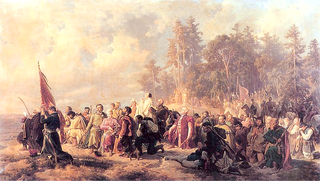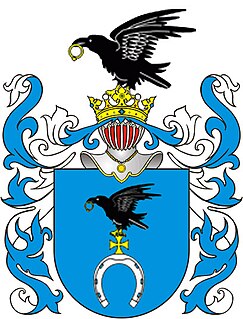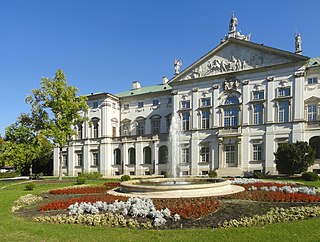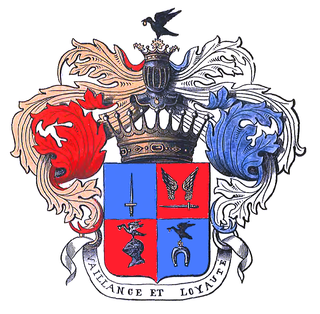See also
| This disambiguation page lists articles about people with the same name. If an internal link led you here, you may wish to change the link to point directly to the intended article. |
Stanisław Krasiński may refer to:
| This disambiguation page lists articles about people with the same name. If an internal link led you here, you may wish to change the link to point directly to the intended article. |

The Bar Confederation was an association of Polish nobles (szlachta) formed at the fortress of Bar in Podolia in 1768 to defend the internal and external independence of the Polish–Lithuanian Commonwealth against Russian influence and against King Stanisław II Augustus with Polish reformers, who were attempting to limit the power of the Commonwealth's wealthy magnates. The founders of the Bar Confederation included the magnates Adam Stanisław Krasiński, Bishop of Kamieniec, Karol Stanisław Radziwiłł, Casimir Pulaski, Moritz Benyowszki and Michał Krasiński. Its creation led to a civil war and contributed to the First Partition of the Polish–Lithuanian Commonwealth. Some historians consider the Bar Confederation the first Polish uprising.

Count Zygmunt Krasiński, a Polish nobleman traditionally ranked with Adam Mickiewicz and Juliusz Słowacki as one of Poland's Three National Bards — the trio of great Romantic poets who influenced national consciousness during the period of Poland's political bondage. He was the most famous member of the aristocratic Krasiński family.

Count Kazimierz Krasiński (1725–1802) was a Polish noble, politician and patron of art. He was the son of Antoni Krasiński and Barbara Zielińska.

Stanislaw Krasiński was a Polish–Lithuanian nobleman (szlachcic).

John Burke Krasinski is an American actor and filmmaker. He is the recipient of a number of accolades, including four Primetime Emmy Award nominations and two Screen Actors Guild Awards. He was named by Time magazine as one of the 100 most influential people in the world in 2018.

Count Wincenty Krasiński was a Polish nobleman (szlachcic), political activist and military leader.

The Three Bards are the national poets of Polish Romantic literature. They lived and worked in exile during the partitions of Poland which ended the existence of the Polish sovereign state. Their tragic poetical plays and epic poetry written in the aftermath of the 1830 Uprising against the Russian rulership, revolved around the Polish struggle for independence from foreign powers.

The Krasiński Palace, also known as the Palace of the Commonwealth, is a reconstructed Baroque palace in Warsaw, Poland, on Krasiński Square. Initially erected between 1677 and 1683 for the powerful Krasiński family, it was heavily damaged during World War II and rebuilt in the mid-20th century.
Krasiński is a surname of Polish, or generally Slavic, origin.

Adam Stanisław Krasiński (1714–1800) was a Polish noble of Ślepowron coat of arms, bishop of Kamieniec (1757–1798), Great Crown Secretary, president of the Crown Tribunal in 1759 and one of the leaders of Bar Confederation (1768–1772).
Michał Hieronim Krasiński was a Polish noble, cześnik of Stężyca, podkomorzy of Różan, starost of Opiniogóra, deputy to many Sejms, one of the leaders of Bar Confederation (1768–1772).

Płock Voivodeship was a unit of administrative division and local government in the Kingdom of Poland from 1495 until the partitions of Poland in 1795. Together with the Rawa Voivodeship and Masovian Voivodeship it formed the former of Duchy of Masovia.

Delfina Potocka, née Komar, a Polish countess, was a friend and muse to Polish expatriate artists Frédéric Chopin and Zygmunt Krasiński. She was noted for her beauty, intellect and artistic gifts. In her youth she was a piano student of Chopin.

The Roman Catholic Diocese of Kamyanets-Podilskyi is a diocese of the Latin Rite of the Catholic Church in Ukraine. Maksymilian Leonid Dubrawski is the current bishop of the diocese. He was appointed to the See of Kamianets-Podilskyi in 2002.

The Czapski Palace, also called the Krasiński, Sieniawski or Raczyński Palace, is a substantial palace in the center of Warsaw, at 5 Krakowskie Przedmieście. It is considered one of the most distinguished examples of rococo architecture in Poland's capital.
Society of Motherland Friends was a secret society of patriotic youth created in Warsaw under the Prussian partition in 1803 by son of starosta of Opinogóra Wincenty Krasiński with a help of young aristocrats: Józef Krasiński, Ludwik Pac, Stanisław Małachowski, Henryk Łubieński, Piotr Łubieński and Tomasz Łubieński, and under the protection of the Marshal Stanisław Małachowski, in whose chateau by the Krakowskie Przedmieście street they held their first meetings. The spiritual patron of the organization was Tadeusz Kościuszko.
Stanislaw Krasiński was a Polish-Lithuanian nobleman (szlachcic) and politician.
The Orchestra Conductor is a 1980 Polish drama film directed by Andrzej Wajda. It was entered into the 30th Berlin International Film Festival, where Andrzej Seweryn won the Silver Bear for Best Actor. It was also shown at the 1980 New York Film Festival.

Krasiński is the surname of a Polish noble family. Krasińska is the feminine form. The name derives from the village of Krasne in Masovia. The family dates from the 14th century. Its members were landowners and politically active in Masovia, Lithuania and Halychyna. The Krasiński family has produced officers, politicians and bishops. Probably its most celebrated member is the 19th-century poet, Zygmunt Krasiński, one of Poland's Three Bards.
Ludwik Krasiński of Ślepowron was a Polish royal courtier, the castellan of Ciechanów and, in 1637, the starosta of Płock.